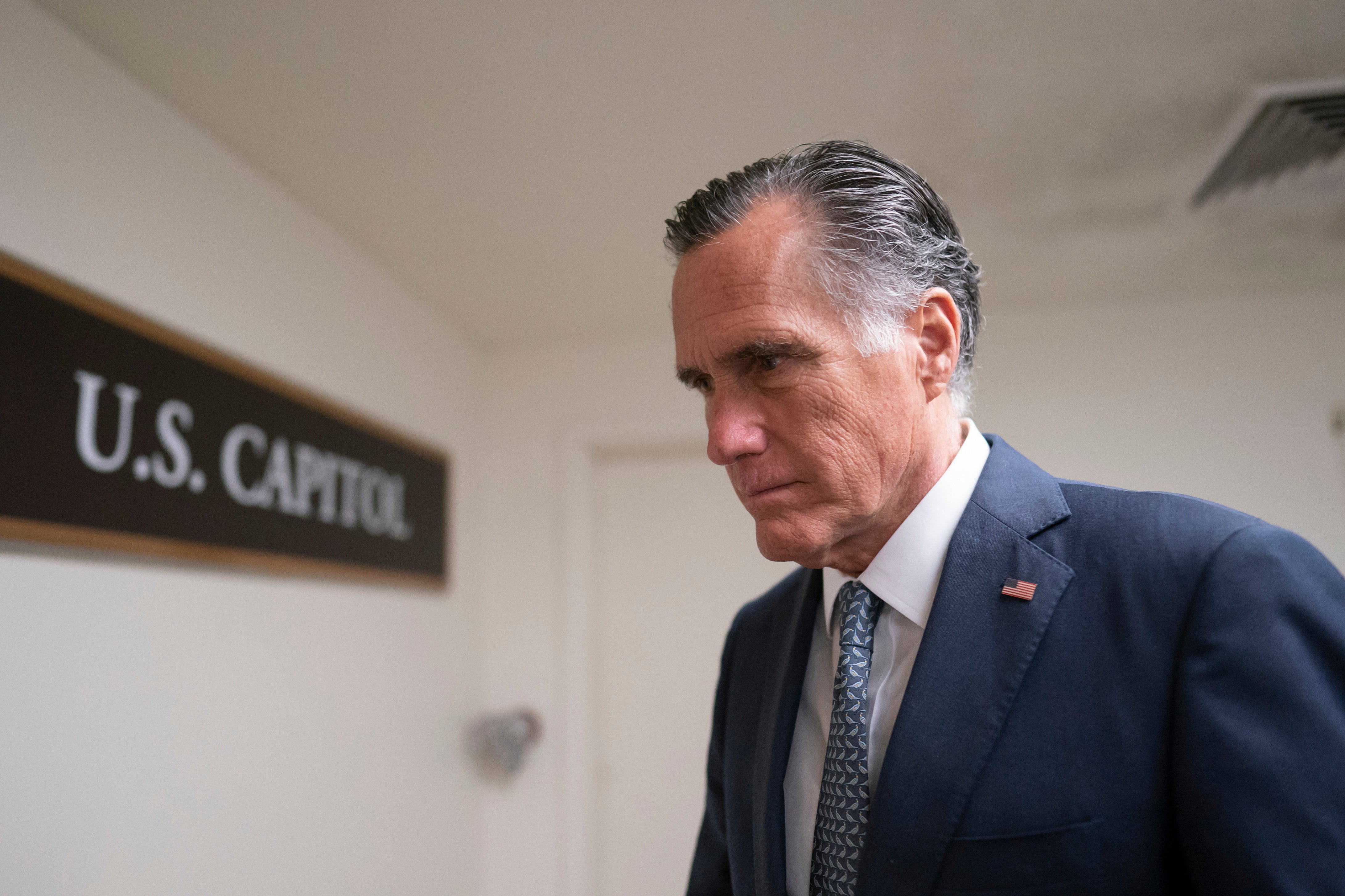Mitt Romney is stepping down because he’s too old. What about McConnell and Biden?
Romney’s decision to walk away comes at a time when many politicians of both parties cling to power


Your support helps us to tell the story
From reproductive rights to climate change to Big Tech, The Independent is on the ground when the story is developing. Whether it's investigating the financials of Elon Musk's pro-Trump PAC or producing our latest documentary, 'The A Word', which shines a light on the American women fighting for reproductive rights, we know how important it is to parse out the facts from the messaging.
At such a critical moment in US history, we need reporters on the ground. Your donation allows us to keep sending journalists to speak to both sides of the story.
The Independent is trusted by Americans across the entire political spectrum. And unlike many other quality news outlets, we choose not to lock Americans out of our reporting and analysis with paywalls. We believe quality journalism should be available to everyone, paid for by those who can afford it.
Your support makes all the difference.In some ways, Sen Mitt Romney’s decision to not seek a second term isn’t surprising. Mr Romney is the only Republican senator who voted to convict Donald Trump during both of his impeachment trials, and he has taken numerous other votes that would make him seem downright heretical in the modern-day GOP.
Conversely, Mr Romney remains one of the few Republicans actually interested in governing, having brokered deals on Covid-19 relief, the bipartisan infrastructure bill and the first major piece of gun control legislation in almost three decades. Few senators, let alone freshmen, have accomplished as much.
But perhaps the most surprising part of his decision is the specific reason why the 2012 Republican presidential nominee said he would leave the United States Senate. Specifically, Mr Romney cited his age.
“At the end of another term, I'd be in my mid-80s,” he said. “Frankly, it's time for a new generation of leaders. They're the ones that need to make the decisions that will shape the world they will be living in.”
Throughout his career, Mr Romney has always tried to portray himself as vigorous man and in between his loss to Barack Obama and his time in the Senate, he participated in a charity boxing event with Evander Holyfield.
Mr Romney saying that he simply would be too old stands in stark contrast to many of his peers. The United States Senate has long been seen as a place that is out of touch with the American public specifically because of senators’ advanced age.
The median age in the Senate as of right now is 65.3, which is slightly up from the previous Congress, when the median age was 64.8. And many voters are starting to see the effects of such a geriatric Senate.
And it is not uncommon for some senators to die in office, as was the case with the late John McCain, who beat Mr Romney for the 2008 Republican presidential nomination, in 2018. Sen Ted Kennedy, who beat Mr Romney in his first political campaign when he ran for Senate in 1994, died in 2009.
But one does not even have to look to the past to see how senators staying past their prime tarnishes their legacy. Earlier this year, Sen Dianne Feinstein, 89, was out for an extended period after she contracted shingles. But even before that, many stories in the press have abounded about her declining memory. Since her return, Ms Feinstein often avoids reporters and is accompanied by someone pushing her in a wheelchair.
Meanwhile, many began to raise questions about whether Senate Minority Leader Mitch McConnell, often seen as one of the most cold-blooded operators, could continue to do his job after the 81-year-old Kentuckian took a spill and suffered a concussion at a Washington hotel and then proceeded to freeze in front of reporters twice in as many months.
Questions about politicians’ age are not just reserved for the upper chamber either. Last year, Nancy Pelosi, who at 83 was often considered one of the most effective speakers of the House, announced she would step aside from leadership, but last week announced that she would seek another term representing San Francisco.
Similarly, next year’s presidential election looks set to be a rematch between former president Donald Trump and President Joe Biden. When Mr Trump assumed office in 2017, he became the oldest president to serve, only to be bested by Mr Biden. If Mr Trump were to win, he would be 79 when he assumed a second term and if Mr Biden were to win, he’d be 82 on 20 January 2025.
Voters are also starting to feel that their leaders are out of touch. A CNN poll earlier this month showed that 49 per cent of Democrat and Democratic-leaning voters cited Mr Biden’s age as their main concern. But with no viable Democratic primary challenger, Democratic voters might be stuck with Mr Biden despite the fact he had just a few years ago referred to himself as a “bridge candidate” for the next generation.
That makes Mr Romney’s decision all the more remarkable. Plenty of elected officials feel they need to stay on until they feel their work is complete. And Mr Romney, perhaps the loudest critic of the Trumpist wing in the GOP, could have plenty reason to argue he wants to save the GOP from itself. But the fact he is walking away shows he wants to preserve his legacy as a statesman of the Republican Party and the Senate rather than face the same lingering questions his peers face.



Join our commenting forum
Join thought-provoking conversations, follow other Independent readers and see their replies
Comments